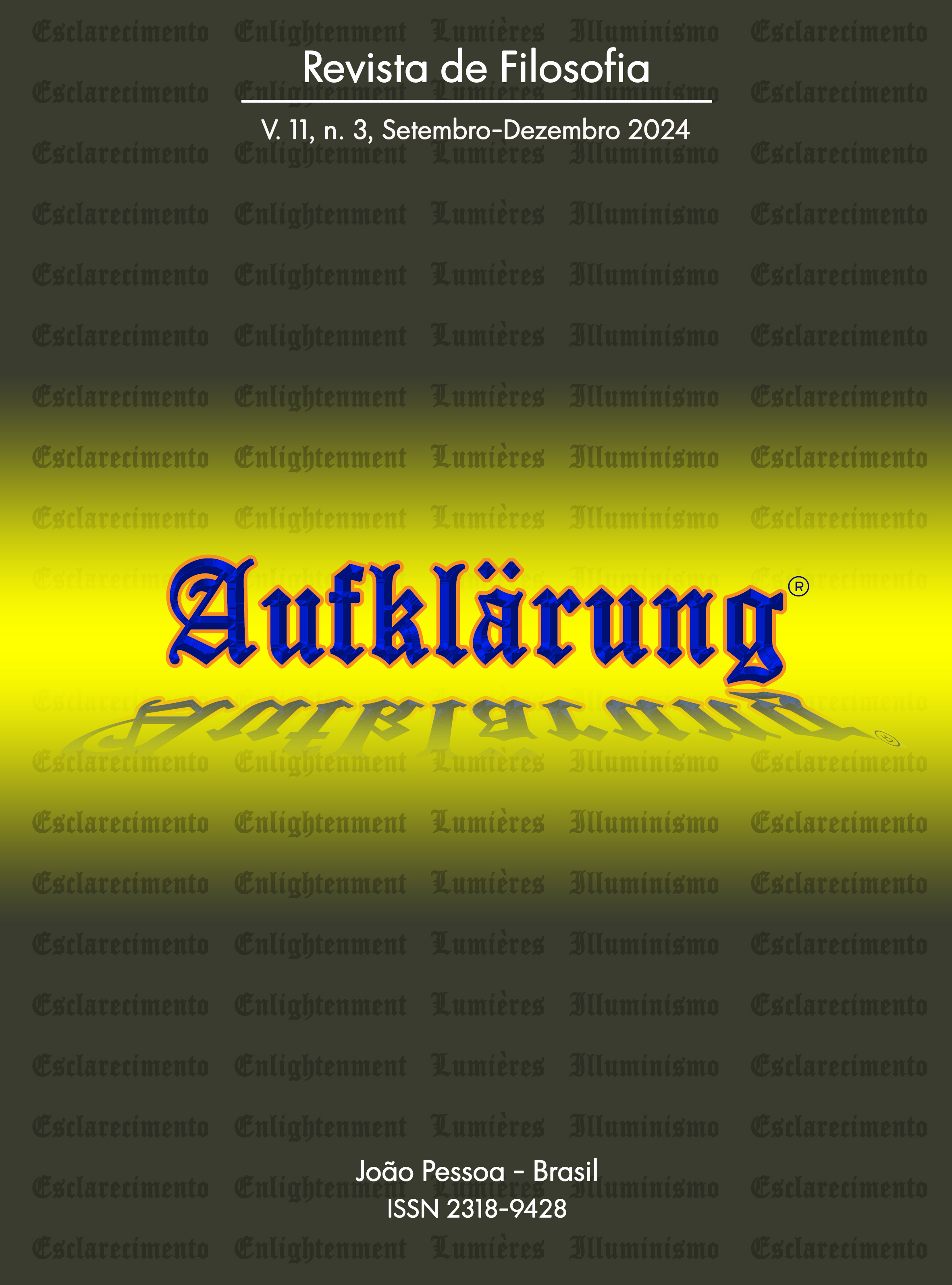The term Verstehen as a relationship between Psychology and Knowledge Theory in the work Ideas by Wilhelm Dilthey
DOI:
https://doi.org/10.18012/arf.v11i3.70279Keywords:
Dilthey, Psicologia, Teoria do Conhecimento, VerstehenAbstract
The term Verstehen, during the 19th and 20th centuries, was widely used in philosophical currents such as hermeneutics, history and phenomenology. Even today, its conceptualization is discussed and applied in the scientific context of areas such as psychology, philosophy, law and others. This fact highlights its relevance and points to the need for continued investigation. Thus, the objective of the present work is to discuss the implications of Verstehen in the work Ideas on a descriptive and analytical psychology, 1894, by Wilhelm Dilthey regarding the relationship between Psychology and Theory of Knowledge. It is known that the author is at the basis of the thinking of the social sciences that developed in the 20th century and that this concept was present throughout his theoretical construct. However, it is in the undertaking of his descriptive psychology that a clearer elucidation of the epistemological and methodological intentions that the concept was responsible for in Dilthey's general work begins. In this way, for proper understanding, we intend to present the questions that the philosopher was asking; elucidate the development of the concept in the author's general work; and discuss the implications of the term in relation to the objective of the sciences of the spirit and in defense of its current relevance in the social and scientific scenario.
Downloads
References
AMARAL, Maria Nazaré de Camargo Pacheco. Dilthey: um conceito de vida e uma pedagogia. São Paulo: Perspectiva: Editora da Universidade de São Paulo, 1987.
BEISER, F. After Hegel: German Philosophy (1840-1900). Princeton: Princeton University Press, 2014.
BEISER, F. C. The German Historicist Tradition. Oxford: University Press, 2011.
BEISER, F. Johann Friedrich Herbart Grandfather of Analytic Philosophy. New York: Oxford University Press, 2022.
BEISER, F. Philosophy of Life German Lebensphilosophie 1870–1920. Oxford: University Press, 2023.
BEISER, F. The Genesis of Neo-Kantism (1796-1880). OXFORD: OUP, 2014.
DILTHEY, Wilhelm. Filosofia e educação: textos selecionados. Organização e introdução Maria Nazaré de Camargo Pacheco Amaral. São Paulo: Editora da Universidade de São Paulo, 2010a.
DILTHEY, Wilhelm. Ideas concerning a descriptive and analytic psychology. Translated by R. M. Zaner, & K. L. Heiges (Eds.), Descriptive psychology and historical understanding. The Hague: Nijhoff. 1977.
DILTHEY, Wilhelm. Ideias acerca de uma psicologia descritiva e analítica. Trad. Artur Morão. Covilhã: LusoSofia Press, 2008.
DILTHEY, Wilhelm. Ideias de uma psicologia descritiva e analítica. Rio de Janeiro: Via Verita, 2011.
DILTHEY, Wilhelm. Introdução às ciências humanas: tentativa de uma fundamentação para o estudo da sociedade e da história. Rio de Janeiro: Forense Universitária, 2010b.
DILTHEY, Wilhelm. Introducion a las ciencias del espiritu: En la que se trata de fundamentar el estudio de la sociedad y déla historia. México: Fondo de Cultura Económica, 1978.
DILTHEY, Wilhelm. Introduction to the Human Sciences. Translated by Rudolf A. Makkreel and Frithjof Rodi. Princeton, N.J.: Princeton University Press, 1989.
KANT, Immanuel. Crítica da razão pura - Petrópolis, RJ: Vozes, 2015.
KANT, Immanuel. Princípios metafísicos da ciência da natureza. Lisboa - Portugal. EDIÇÕES 70 – 2019
MAKKREEL, R. A.; RODI, F. Introduction. In: DILTHEY, W. (Selected Works, v. I) Introduction to the Human Sciences New Jersey: Princeton University Press,), 1989.
MAKKREEL, R. Dilthey: Philosopher of the Human Studies. New Jersey: Princeton University Press, 1992.
MAKKREEL, R. Vico and Some Kantian Reflections on Historical Judgment. Boston: Man and World 13. – p.99-120, 1980.
MAKKREEL, R. Wilhelm Dilthey. The Stanford Encyclopedia of Philosophy (Spring 2021 Edition), Edward N. Zalta (ed.), 2021.
PORTA, Mario A. G. A Filosofia a partir dos seus problemas. São Paulo: Editora Loyola, 2014.
PORTA, Mario A. G. Natur und Geist: a escola de Baden como teoria complementar do positivismo. Pensando – Revista de Filosofia Vol. 9, Nº 17, 2018.
PORTA, Mario A. G. O pensamento de Immanuel. Brasília: DF. Academia Monergista, 2023.
PORTA, Mario A. G. Psicologia e Filosofia: Estudos sobre a querela em torno ao psicologismo (Psychologismusstreit). São Paulo: Editora Loyola, 2020.
REIS, José Carlos. Wilhelm Dilthey e a autonomia das ciências histórico-sociais. Londrina: Eduel, 2003.
RODI, Frithjof. Dilthey's concept of 'structure' within the context of nineteenth-century science and philosophy. In Rudolf Makkreel John Scanlon (ed.), Dilthey and Phenomenology. pp. 107—124, 1987.
Additional Files
Published
How to Cite
Issue
Section
License

This work is licensed under a Creative Commons Attribution 4.0 International License.
Journal general policy
1.This journal works under a Creative Commons License aplied to online journals. That icence can be read in the following link: Creative Commons Attribution 4.0 International (CC BY 4.0).
2.Accordingly to this License, a)the journal declares that authors hold the copyright of their articles without restrictions, and they can archieve them as post-print elsewhere. b)the journal allow the author(s) to retain publishing rights without restrictions.
Metadata Policy for information describing items in the repository
1. Anyone may access the metadata free of charge at anytime.
2.The metadata may be re-used in any medium without prior permission, even commercial purposes provided the OAI Identifier or a link to the original metadata record are given, under the terms of a CC BY license refered for the Journal.







































